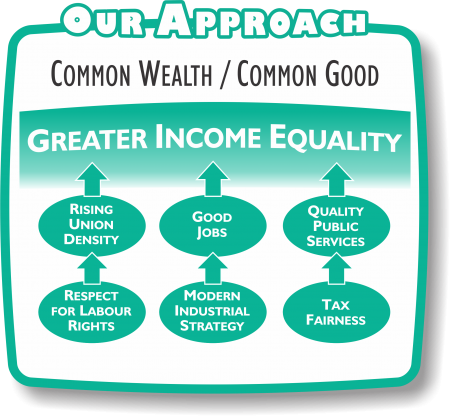UNION YES!
Workers vote for union: teach ‘co-op’ what it means to co-operate

Alex Charron, right, stands with co-worker outside the Victoria MEC store
WE ARE ALL MEANT TO MAKE THE SAME MISTAKE. We’re all led to believe Mountain Equipment (MEC) is a real co-op. It isn’t. But, pro-union votes by workers at two of the company’s stores may make the company claim a little more legit. Not that MEC ever cared.
MEC management did all they could to stop their workers from joining the UFCW (United Food and Commercial Workers) union. The workers voted union anyway.
Workers at the MEC stores in Vancouver voted to go union in June; workers at the MEC store in Victoria did the same in November.
‘Co-op values’ absent
The MEC “brand” trades a lot on the idea of being a co-op: a place where co-op values like concern for community are supposed to count more than the bottom line. That’s why you can’t just shop at MEC. You have to pay five dollars first to become a co-op member—then shop.
The Co-opertive Learning Centre says a consumer co-op “is not operated to maximize profits . . . but to maximize members’ co-operative advantage, i.e. quality products and services at the best price.”
MEC did not work to any such values during the union organizing drives. The union filed unfair labour practices complaints in each case and a bad faith bargaining compliant during negotiation for a first contract after the union was ratified in the Vancouver store.
Brand consultant David Kincaid says MEC is at a critical point “because I don’t believe the market views them as a co-operative any longer.”
Four friends who loved hiking, climbing and all things outdoors founded MEC in Vancouver in 1971. Their primary purpose was to provide a local source for more and better gear for outdoor enthusiasts like themselves. The not-for-profit ideals of a consumer co-op appealed to them.
It was a business model that worked for a long time: MEC now has 20 stores all across Canada, with 2300 employees and almost half a billion dollars in sales in 2019. But, its big time corporate success has made it hard to hold on to the values its core customers expect and like.
In October of 2018, MEC CEO David Labistour wrote an open letter apologizing for a lack of diversity in MEC’s advertising campaigns and signed a pledge to correct the gap.
In March of last year, after an online petition, it dropped CamelBak and other brands owned by a U.S. company that also sells guns. More recently, MEC’s new Toronto store drew criticism for its big-box design in a heritage neighbourhood.
MEC was not nearly as ready to accommodate its workers in Vancouver however.
UFCW negotiator Patrick Johnson said management at the store and head-office levels “ran a strong anti-union campaign” that included directing employees to an anti-union website called LabourWatch. “MEC is in reality a big time retailing chain and that’s how they acted.”
Not quite a 'dream job'
Alexandre Charron bought his MEC co-op membership in 1995 when he was a teen rock climber in Ontario. He thought getting hired in 2018 to work at the climbing counter in MEC Victoria would be a “dream job.” When it wasn’t, he became a union activist.
He says he expected MEC would work hard to block the union, “but what they did even surprised me, to actually see it happen, especially given some of MEC’s rhetoric around worker empowerment and fair trade and even supporting unionization abroad in their own factories.”
Alexandre said managers played up the threat of a strike. They posted memos in the elevator, washrooms and by the punch clock to warn workers they’d have to “live with the outcome” if they voted for union representation.
He says senior management came to Victoria to discourage employees from unionizing. They included the CEO, the chief operations officer, the head of human relations, the western regional manager and others.
“They came all of a sudden and stayed for three days... leading up to the vote. They put a lot of pressure on us.”
“It was a very stressful and difficult week and one that I don’t wish on any other employees.”
Alexandre says he’d been attracted to MEC because of the values it was supposed to hold. His experience in the union drive has changed all that.
“Here is MEC, this very progressive seeming organization, behaving in the same way as a Walmart or an Amazon towards its workers and in contradiction to its own rhetoric about empowerment and fairness and equality.”
“It’s something people should know.”
- 30 -













Add new comment